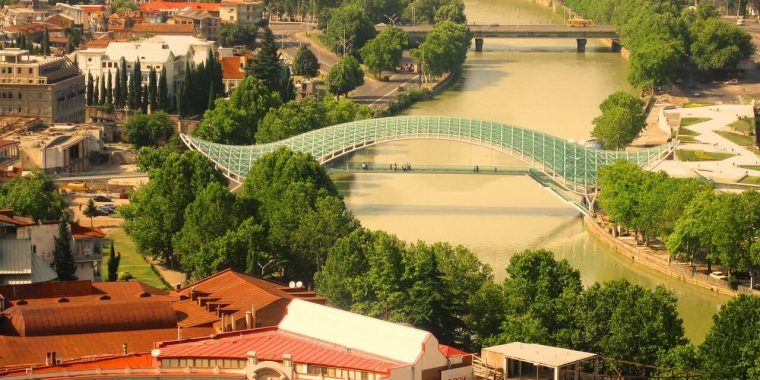Recently, I visited Tbilisi, Georgia for a short business trip. This post enlists some of my major observations about Tbilisi during the course of my brief visit. A lot has been spoken about the natural landscape and stunning regions of Georgia, so I will bypass that. Plus, I will stick only to Tbilisi and no other Georgian city, simply because I couldn’t visit the others.
Georgia is a small mountainous country. This ex-Soviet state has been making steady progress of late, and more and more visitors are nowadays heading towards Georgia for tourism.
First Impression
Upon arrival at the Shota Rustaveli Tbilisi International Airport, immigration was a breeze. The officer on duty asked for a routine set of documents, namely, return ticket, hotel booking and bank statements.
Outside the airport, there were stalls for a wide variety of things — banks, currency exchange and of course, SIM cards. Magti, Georgia’s largest telecom operator, is well known in the region for its reliable reception and 4G+ network. However, the Beeline stall had no queue whereas Magti’s did. I chose to save time by opting for Beeline — bad decision, almost half of the time my Beeline SIM card had very poor network reception.
The weather in Tbilisi was sunny, albeit with a noticeably chilly breeze that gained momentum at night. This remained the trend throughout my stay there.
Life in Tbilisi
Tbilisi has an air of enigma attached to it. Maybe it’s the weather or the old architecture, but one can stay outdoors all day in Tbilisi and not feel tired.
Compared to central Europe, life in Tbilisi is slow. As a former Soviet city, Tbilisi’s infrastructure has a mix of both old and new. The city’s metro lines are pretty good and not very crowded. Roads are good too, but traffic lights and signals are not strictly observed, especially by the natives. City buses, locally called Marshrutka, are easy to find (though I failed to figure out their route maps even after multiple attempts).
The people are friendly and most of them would go out of the way to help a foreigner. If you stop by to ask for directions, you can expect some free advice along the way. “Yes, take the right turn to get to the old market. Oh, and don’t forget to bargain!”
Tbilisi’s police force is quite proactive. When I took a taxi late at night to get to the airport, it was stopped on two separate occasions by police patrol vehicles — simply to conduct a breathalyzer test on the driver.
My stay in Tbilisi was not long enough for me to comment with authority on local lifestyle and customs. Yet, certain things were far too obvious, such as:
Food and Drink
Georgians love their food. Every street has food shops, and eating between meals is a common practice. However, I had some trouble finding Halal meat products in Tbilisi. Virtually every popular non-veg dish had bacon in it. This was more common in the upscale circles — after a while, I gave up all hopes of finding non-vegetarian food that I could eat. I started telling everyone that I’m a vegetarian, simply to avoid explaining why I was turning down their offers of delicious bacon and beef. Things might be different in other cities, such as Batumi.
Drinking running tap water is not uncommon in Tbilisi. Of course, filtered water is available, but a good number of local residents simply consume water from the tap — “Hey, our government filters it for us!”
Language
Note: Let’s be honest, English-speaking skills are not a metric of anything. Georgia is a multilingual society by all means. But considering the fact that my blog’s audience is predominantly English-speaking, it’s something that is worth mentioning.
Georgian can be a slightly difficult language to grasp, so be sure to have a local translator nearby if you are venturing somewhere far out in Georgia. Russian is spoken by most people in Tbilisi, even in rural areas. Turkish and even Farsi speakers can be found in the city.
With that said, English-speaking abilities are rare in Tbilisi. This was a slightly shocking discovery for me — I have not had any trouble interacting in English with folks from places such as Baku, Minsk or Kiev.
Taxi drivers fail to comprehend “airport” until you say it thrice, each time slower than before. Furthermore, you can spend ten minutes and locate a couple of grammatical errors in most leading English newspapers of the country. Also, many locals who claim to be good at English tend to speak primary school version of it — an English newspaper editor I spoke to did not understand “He is unwell”, until it was spoken as “He is ill”.
Once again, knowledge of English (or lack thereof) does not always matter. But if your primary language is English and you are planning a trip to Georgia anytime soon, this is something that you should bear in mind.
Economy and Tourism
Georgia’s economy, much like that of any other ex-Soviet country, is still recovering from the after-effects of the Cold War. Median wages are rather low and cost of living, in general, is acceptable. Internet, food, transport, rent, and virtually everything else that you might need to live properly is affordable.
The startup scene is nothing much to talk about. While the government is attempting to offer support to upcoming businesses, Georgia is still nowhere near the likes of, say, Estonia when it comes to doing business.
However, two things deserve to be mentioned.
Banking
First, the banking sector in Georgia is extraordinarily well developed. You can walk in to any bank, open an account, and get your personalized ATM card, internet banking credentials and other stuff delivered to you within 48 hours. Furthermore, banks in Georgia are not averse to opening accounts for non-residents.
But it does not stop at that. Even the smallest of bank branches in Tbilisi allow users to open multi-currency accounts. I noticed several Georgian entrepreneurs and businesspeople chose to keep their money not in Georgian Lari (GEL), but in Euro (or very rarely, USD). Their reasons were rather straightforward — the fluctuation of Russian Ruble has caused a trust issue with local currencies in the region. There is a section of entrepreneurs who wonder if their corporate money is safe in GEL. Euro, on the other hand, evokes a better sign of trust and does not seem to be collapsing anytime soon. Kudos to Georgian banks for making life easier for their customers!
Tourism and Hotels
Second, tourism plays a very vital role in Georgia’s economy. Georgians are aware of the fact that their country is beautiful and blessed with natural scenery. With an ever-increasing number of tourists coming to Georgia, many families in Tbilisi have made hospitality their primary occupation. It is not uncommon for a Georgian family to rent out two spare rooms in its house and call it a “budget hotel”.
In fact, “hotel” has become a very vague term in Tbilisi because every other household is a hotel. Got five rooms in your house and a family of three? Keep two rooms to yourself, and rent out the remaining three online! Congrats, you now have your own “hotel”!
Similarly, businesses related to taxis and cabs, tour guides, etc. are very common in Tbilisi. Informal currency exchanges happen quite a lot too — small shopkeepers selling cosmetics and soft drinks would gladly convert your foreign currency into GEL.
Religion and History
Georgians know their history well. As you walk around the city, you can ask any passerby about the history or background of a monument (assuming he or she can speak your language, or you can speak theirs). You will get a detailed and mostly accurate answer.
But this is only selective knowledge. Information pertaining to Tbilisi’s Islamic heritage is often unknown to the common folks here — ask anyone about Tbilisi’s days as al-Tiflis or the Emirate of Tbilisi, and they will give you a confused look.
Speaking of that….
Islam in Georgia
Nearly 10% of Georgia’s total population is Muslim. In the past, it was fairly common for Georgian rulers to embrace Islam, the most notable example being King Vakhtang VI of Kartli. Under Caliph Uthman ibn Affan (RA), al-Tiflis (Tbilisi) developed as an important city due to its close proximity to both Arabia and Europe.
Ever since 2011, Georgia has had its own Georgian Muslims’ Department to manage the affairs of Muslims in the country.
In Tbilisi, I noticed an overall gentle sense of secularism. Owing to tourists coming from the Arabian Gulf and Turkey, Islamophobia is not paramount in the city. Georgians are a welcoming group of people — on two separate occasions, receptionists greeted me with Salam. There are masjids in almost every major city, and a good number of students from neighboring Muslim countries study in Georgian universities.
Conclusion
My trip was too short and unfortunately I could not visit other Georgian cities, especially Batumi. But from what I saw in Tbilisi, Georgia is a laid-back country blessed with scenic beauty. With a moderate cost of living, Tbilisi is a good pick for anyone looking to get closer to Europe. This explains why many digital nomads are flocking to Georgia of late and applying for residence permits.
But is it for me?
While I admired the good banking infrastructure, transportation and the peaceful ambience in Tbilisi, it did not fully chime in with my manner of living. Linguistic barrier, culinary differences (and lack of multiple coffee houses), etc. came into play. Personally, I found Tbilisi to be the kind of city I would gladly visit twice a year, but not permanently reside in.

